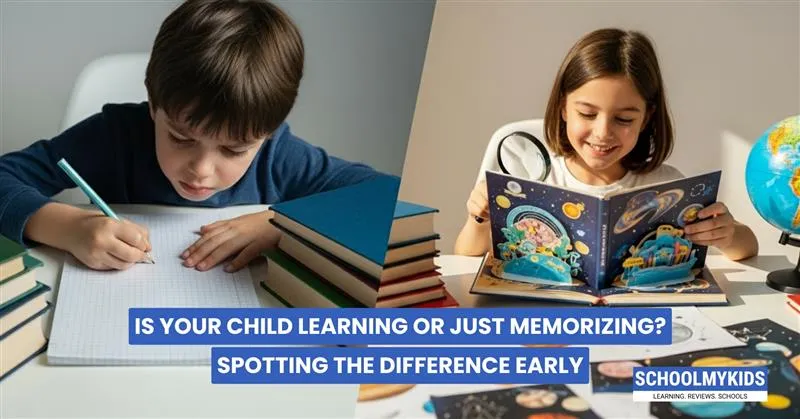Many children spend hours studying, filling notebooks, and repeating lessons over and over. But when exam time comes, some of them forget everything within days. This makes parents wonder: Was my child really learning, or were they just memorizing?
This is an important question, because the way a child studies today shapes how they will think, solve problems, and succeed tomorrow. Memorizing and learning are not the same, even though they sometimes look similar.
Learning vs. Memorizing: What’s the Real Difference?
Think about learning as really understanding something, while memorizing is just remembering words, facts, or steps for a short time. If a child can repeat a math formula, but doesn’t know when or why to use it, that’s memorizing. But if they can solve a new problem or explain it to someone else, that’s true learning.
For instance,
- Memorizing is knowing that 7 x 8 = 56, but struggling to use multiplication to solve a real-life question at the grocery store.
- Learning is understanding what multiplication means and using it to split a bill in a restaurant or figure out items for shopping without looking at a book.
Memorization is useful for quick recall, like spelling tests or important dates, but it rarely lasts, and the knowledge fades faster than we think. Learning sticks around; it lets you use information, connect ideas, and solve problems in new situations.
How to Spot It: The Signs at Home
Here’s how you can tell if your child is truly learning or just memorizing:
- Ask for Explanations: If your child can teach a concept to you or a sibling in their own words, they probably understand.
- Check Real-World Use: Ask them simple questions that use knowledge in a new way ("How could this science idea help in daily life?").
- Watch for Quick Forgetting: If things are forgotten soon after a test or homework, chances are they were not learned, but rather memorized.
- Questions vs. Answers: Does your child ask "why" and "how" about topics, or just focus on memorizing the correct answer?
- Solving New Problems: Can they solve problems or handle questions not exactly like the ones they've studied? Learning means adapting, not just recalling facts.
Helping Kids Move From Memorizing to Learning
If you notice a lot of rote memorization, that’s okay, as it's common. But it’s time to shift gears:
- Connect Ideas: Ask your child to link what they're studying to something in their own life ("How does this social studies topic connect to your community?").
- Encourage Questions: Being curious is not just allowed, it’s great for learning. Praise questions, not just correct answers.
- Practice, Don’t Cram: Instead of just reading notes before an exam, use active recall: quiz each other, make flashcards, or summarize lessons aloud (like teaching a ‘pretend class’).
- Use Visuals and Activities: Drawing, building models, or acting out scenes can help cement understanding, as kids remember what they do and explain it, much longer than what they just repeat.
- Review and Reflect: After any test or assignment, ask what was hardest, what was easy, and how they might use what they learned elsewhere.
For Students: Tips To Make Learning Last
- Don’t be afraid to say, “I don’t get it.” Real learning starts with honest questions.
- Try explaining things to someone else, without looking at notes.
- Mix up study styles, such as writing, drawing, speaking, and using plenty of examples.
- Look for reasons behind every fact ("Why is this true?" "How does this work?").
- Make connections, such as trying to see how subjects relate to each other in the real world.
Conclusion
Memorizing is only a first step. If children move beyond it (by truly understanding), they hold onto knowledge for years. This builds confidence, leads to better grades, and develops skills that benefit life, not just school.
So, spot the signs early, keep communication open, and support genuine learning and not just memorization.









Be the first one to comment on this story.